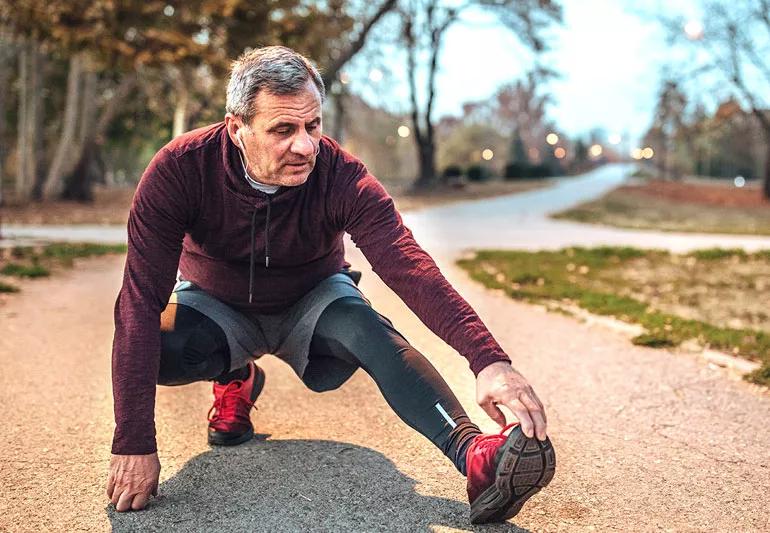And whether evening workouts keep you awake

Exercise is one of the best things you can do for your health. It’s also the last thing you want to do when you’re tired.
Advertisement
Cleveland Clinic is a non-profit academic medical center. Advertising on our site helps support our mission. We do not endorse non-Cleveland Clinic products or services. Policy
But don’t collapse on the couch just yet. If you get your body moving, you’ll feel better. Numerous studies have shown that exercise improves sleep quality. Better sleep means more energy. And it’s easier to exercise when you have energy. It’s a wonderful cycle.
Sleep medicine psychologist Michelle Drerup, PsyD, explains how exercise affects your sleep and how you can maximize its benefits, starting today.
Research has shown that physical activity can be as effective as prescription sleep meds. There are a few reasons why.
“Try to exercise outdoors,” Dr. Drerup says. “You get natural light, which helps your body establish a good sleep-wake cycle. It tells your body when to be alert and when to wind down.”
Can’t get outside? Indoor workouts still help you get better sleep.
Stress and anxiety are sleep’s worst enemies. But exercise can relax you and fight off the things that keep you tossing and turning. “Exercise is probably the best anti-anxiety medication we have,” Dr. Drerup says. “When you exercise, your brain releases feel-good chemicals that combat stress and anxiety.”
The more active you are, the more your body pushes you to sleep at night. “Activity increases your sleep drive,” Dr. Drerup says.
Advertisement
But don’t push yourself to exhaustion with every workout. Just make sure you’re getting some movement. “Being active during the day, even doing things like chores or short walks, can increase your sleep drive,” she says.
Early in the coronavirus pandemic, Dr. Drerup noticed a change that was harming people’s sleep habits. They weren’t getting out or moving as much, making it harder to fall asleep.
“Gyms were closed, many people weren’t going into an office and people were less active in general,” she explains. “The decreased activity lowered their drive to sleep. Add stress on top of that, and you’re really going to struggle to fall asleep.”
There’s a longstanding belief that exercising at night is a bad idea. But recent evidence has busted this myth.
“Exercise raises your core body temperature, and you need that temperature to drop before you can fall asleep,” explains Dr. Drerup. “That’s why many experts believed nighttime exercise was a bad idea. But recent studies have found no evidence supporting the theory that evening exercise keeps you awake. Just keep it light to moderate intensity.”
Dr. Drerup recommends walking, biking or yoga as evening exercise. Save the high-intensity workouts for morning or early afternoon. And make sure your workout ends at least one hour before you turn in.
If you’re not sure whether your workout is too intense, keep a sleep and exercise diary. Record the exercise you did and how you slept that night. If you see a pattern of poor sleep with your workout, dial down the intensity or do it earlier in the day. “Some people can tolerate a hard workout in the evening and still sleep well,” says Dr. Drerup. “But others can’t. You may not know for sure until you try it.”
If you want to stick with exercise long-term, it has to become part of your routine.
“It’s important to develop exercise as a habit,” says Dr. Drerup. “Consistency is key. Pick a time of day that works for you and exercise at the same time every day. If you try to just fit it in when you can, it’s hard to keep doing it.”
Aim for 30 minutes of exercise a day, five days a week. Can’t get in 30 minutes at once? Two 15-minute chunks or three 10-minute chunks will help, too.
If you start exercising today, you may notice better sleep tonight. But even if you don’t feel awesome tomorrow, keep it up for a few days. Within a week, you’ll probably notice you’re sleeping better. To maximize your sleep quality, try to:
Advertisement
Finally, if you’re getting regular exercise but sleep still eludes you, talk with your doctor. You may have a sleep disorder or another health condition. If you have signs of anxiety or depression that aren’t getting better, discuss this with your doctor, too.
Advertisement

Sign up for our Health Essentials emails for expert guidance on nutrition, fitness, sleep, skin care and more.
Learn more about our editorial process.
Advertisement

To avoid sleep deprivation and shift work sleep disorder, try adopting habits that minimize light exposure and prioritize daytime sleep

Sleep disorders, mental health conditions and other health concerns can all affect the quality of your sleep

Most people fall asleep within 10 to 20 minutes, but if your experience is different, adjusting your sleep schedule may help

Stick to a consistent schedule, be mindful of screen time and work on reducing your stress levels before bed

Napping can boost focus, memory and mood — if you time it right
These devices can help shed light on what’s happening with your body during rest

Keep a dream journal, set your intentions before bed and make sure you’re getting a full night of high-quality sleep

Controlling your dreams may help you tap into your creativity and even reduce anxiety

Even small moments of time outdoors can help reduce stress, boost mood and restore a sense of calm

A correct prescription helps your eyes see clearly — but as natural changes occur, you may need stronger or different eyeglasses

Both are medical emergencies, but they are very distinct events with different causes